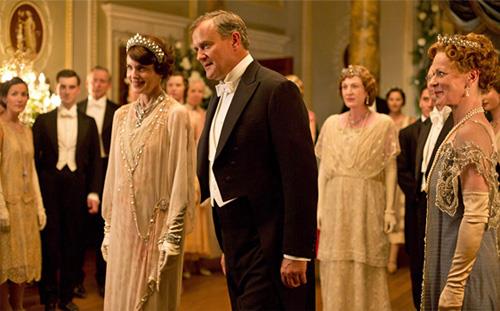
Downton Abbey, the television series, is a tough act to follow.
Downton Abbey, the movie, does a jolly good job.
It opens in theaters Friday, which means "at long last" for fans who have been teased by the movie notion for more than three years.
As it turns out, all those gorgeous visuals do look impressive on a big screen. But this also remains true: No matter how well the movie does, Downton will always, in the hearts of its fans, be a television show.
That said, the several movie plotlines at times feel like a bit of a stretch, to which we say "so what?" because so did a number of the TV series plots. Mr. Pamuk, anyone?
No, Downton rose and soared on its characters, brilliantly developed by writer/creator Julian Fellowes and producer Gareth Neame and played beautifully by the large cast.
Downton is soap opera at its most satisfying, and all concerned have played it that way – deadly serious, with only the occasional twinkle in their eyes.
The test for the movie, then, is whether Fellowes and Neame have kept the characters as we remember them while allowing the incremental changes that life has a way of bringing about.
Short answer: They have. Hard-core fans will have little cause to lament that "Mary would never do that" or "Carson would never say that."
As the well-circulated previews have revealed, one foundation plotline has King George V (Simon Jones), his wife Queen Mary (Geraldine James) and their entourage visiting Downton.
This is quite the honor for Lord Grantham (Hugh Bonneville) and his American-born wife Cora (Elizabeth McGovern). It also triggers a chain of consequences, intended and unintended, that bring dramas into new bloom both upstairs and downstairs.
Fellowes skillfully uses these dramas to pick up many of the character threads he was following when the TV series ended.
After a lifetime of rejections and disappointments, second Crawley daughter Edith (Laura Carmichael) seemed to have finally hit the romance jackpot. Oldest daughter Mary (Michelle Dockery), who will inherit Downton, had married the handsome and dashing Henry (Matthew Goode).
Former driver Branson (Allen Leech) had opened an auto dealership and was helping Mary manage Downton. Head housekeeper Mrs. Hughes (Phyllis Logan) had married Carson (James Carter), who had retired and turned the butler position over to Thomas Barrow (Robert James-Collier), who seemingly had pulled his life together after a series of personal and professional disasters.
Kitchen maid Daisy (Sophie McShera) had a newfound confidence and seemingly an upward path, supported by head cook Mrs. Patmore (Lesley Nicol). Ladies' maid Anna (Joanne Froggatt) and her valet husband Bates (Brendan Coyle) had their own place and a dream.
Up at the top, surveying it all, was acerbic Dowager Countess Violet (Maggie Smith), alongside her frequent companion and sparring partner, the gentler Isabel (Penelope Wilton).
The TV series, it’s important to note, didn’t end with cliffhangers. It ended rather peacefully, in fact, with no one on the brink of anything ominous – except possibly Downton itself, which like other British manor estates was facing the increasing possibility that it could become unsustainable.
We viewers know this specter will soon become a crisis, thanks to the Great Depression and another World War. But Downton, the movie, is set only the year after the TV series ended, so none of that yet comes into play.
Which is fine, because it enables Fellowes to focus not on an increasingly awful world, but on lives we felt part of.
At the risk of mild spoilers, fans of Branson and the plucky downstairs staff may be particularly pleased. So will Violet fans, as she gets not only her expected volley of clever repartee but a critical plotline.
Fellowes might have shown a bit more restraint with Mr. Molesley (Kevin Doyle), but then, Mr. Molesley once tried to look younger by rubbing shoe polish into his hair. So there’s precedent.
In general, knowing the TV series will make the movie richer and considerably more nuanced. That said, you don’t have pass a test to understand what’s happening on the screen.
Fellowes inserts a handful of new characters, notably Lady Maud Bagshaw (Imelda Staunton) and Lucy Smith (Tuppence Middleton – no relation to the real-life contemporary Duchess of Cambridge). Both play pivotal roles in a subplot that subtly harks back to the beginning of the first TV season.
Like the passionate fans of any long-running TV show, Downton aficionados will doubtless find moments and details to question or to single out for praise. In that vein, there’s a brief closing scene on a balcony that should get a place on any Downton highlight reel.
On the surface, Downton Abbey, the movie, might seem like a second goodbye. It also doesn’t, and not just because we’ve heard hints that if this movie does well, there could be another.
Rather, the movie reinforces the unspoken sense that this story will continue long after it’s no longer being dramatized.
That’s one of the reasons we like it.